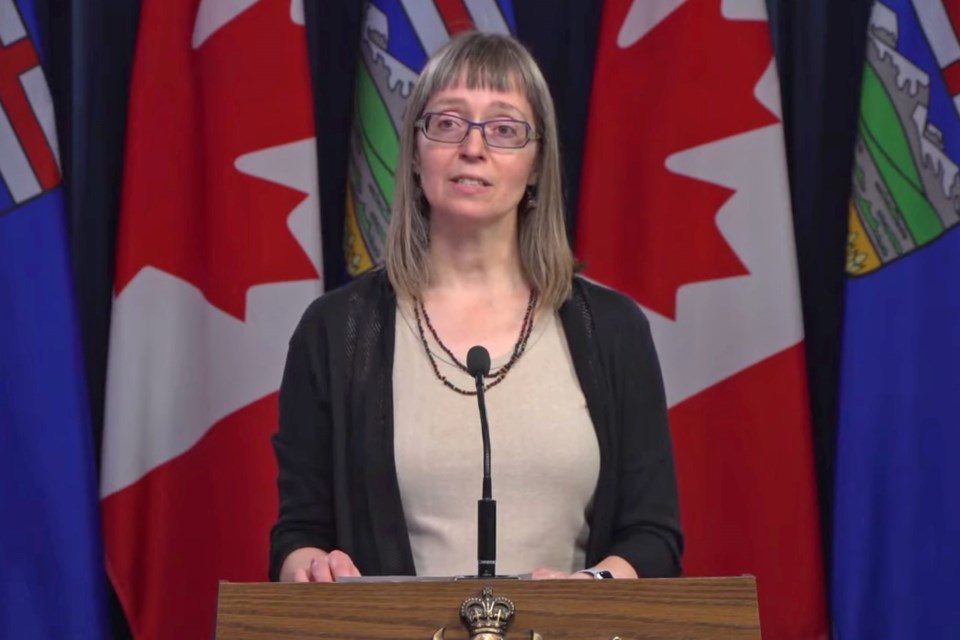Confirmed cases of COVID-19 in Alberta have doubled overnight.
Dr. Deena Hinshaw, Alberta’s chief medical officer of health, announced seven new cases of novel coronavirus on March 10, bringing the total number of cases in Alberta to 14. Those involved in these new cases are recovering in isolation at home with support from public health officials.
One person who was previously announced is currently receiving treatment in hospital. That person had a pre-existing chronic condition.
“I know that any rise in case numbers may feel alarming to some people. Many Albertans are wondering what this means for them, and if cases will continue to rise,” Hinshaw said.“I want to assure Albertans that all of these cases are travel-related.”
Three of the new cases are from the Edmonton zone. They involve a man in his 70s and a female in her 60s who travelled together, and a female in her 30s who had also recently travelled outside of Canada.
The other four cases are from the Calgary zone, involving a man in his 50s, two females in their 30s, and a female in her 40s.
One individual was also on the same MS Braemar cruise ship in the Caribbean as another case announced March 9, involving a woman in her 50s from the Calgary zone.
The travellers had returned from visiting a range of countries, including France, the Netherlands, Egypt, Iran, Taiwan, Germany, Malaysia, Trinidad and Tobago, Panama, the Philippines and the United States.
Hinshaw said as several of the people visited more than one country on their trip, it’s not known where the individuals picked up the virus.
The fact that all of the confirmed cases are travel-related “indicates that we continue to take the right approach at this time,” she said.
“Our public health measures are doing precisely what they were intended to do, detect new cases and take immediate action. This means the number of confirmed cases will likely continue to increase in the weeks ahead.”
Many people who get COVID-19 will experience minor symptoms and recover on their own, but others are at risk of serious complications. COVID-19 can be extremely serious, and even fatal, for seniors and those with underlying health conditions.
Hinshaw said anyone who is feeling unwell, even if they have not travelled, is asked to stay at home and not visit hospitals, long-term care facilities or supportive living accommodations.
Alberta and Alberta Health Services are developing new precautionary materials for schools and long-term care facilities to update them on the situation and provide additional advice.
Tuesday morning, Hinshaw said she participated in a telephone townhall with municipalities and emergency managers to discuss preparation.
“While the risk of exposure remains low in Alberta, we are taking all necessary steps to prepare the health system in case the risk level changes in the coming weeks.”
As of March 10, there are 86 confirmed and presumptive cases of COVID-19 in Canada.
RELATED: Hundreds line up at Costco to stockpile bulk goods
RELATED: 'It's not rocket science': Mass hand washing, not hysteria, will prevent spread of COVID-19
RELATED: Alberta now has seven coronavirus cases
Additional recommended public health measures
- All Albertans should practise good hygiene, such as frequent handwashing, and should stay home if feeling ill.
- All travellers returning from outside Canada should monitor their health for 14 days after coming home. If they develop symptoms, they should self-isolate and call Health Link 811.
- All travellers returning from Iran or Hubei Province, China, should self-isolate until 14 days have passed since their visit. If they develop symptoms, they should call Health Link 811.
- Anyone experiencing symptoms of COVID-19 such as fever or cough linked to recent travel or other health concerns should contact Health Link 811.
- Anyone who is feeling ill, even if they have not travelled, should stay home and not visit hospitals, long-term care facilities or supportive living accommodations. Albertans who are not experiencing symptoms can continue to visit loved ones in these facilities.
- Anyone organizing group events should undertake a risk assessment considering who may attend, the nature of the event, and what is happening in their local community.
- All municipalities, businesses and other organizations should continue business continuity planning to prepare critical operations for any potential interruption.
Best practices
- Wash your hands often and well
- Avoid touching your face, nose, or mouth with unwashed hands.
- Avoid close contact with people who are sick
- Clean and disinfect surfaces that are frequently touched
- Stay at home and away from others if you are feeling ill
- When sick, cover your cough and sneezes and then wash your hands



